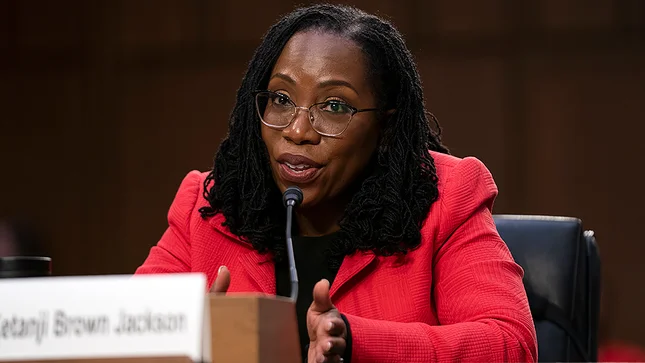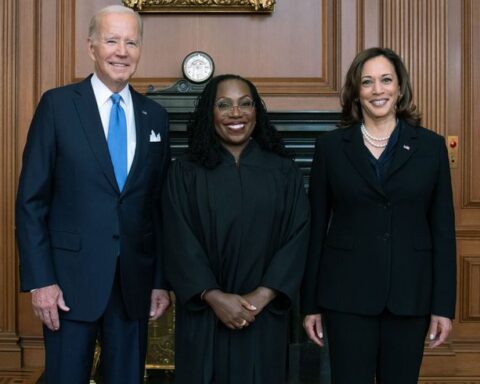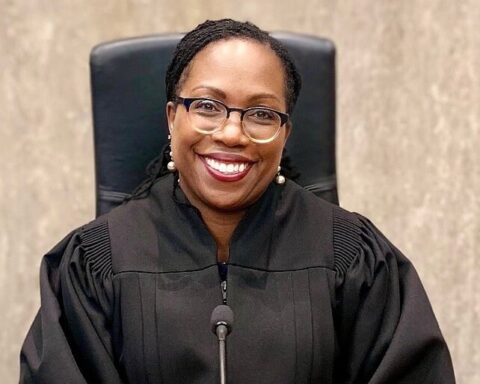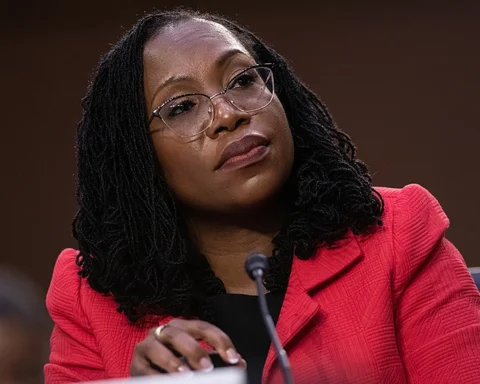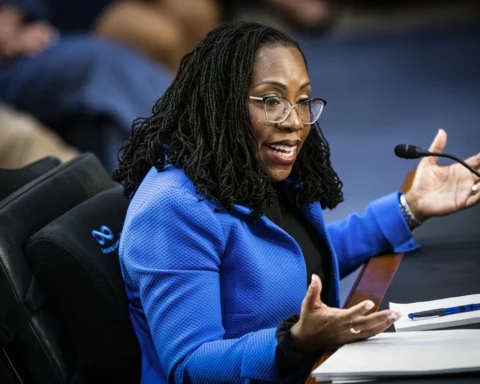Judge Ketanji Brown Jackson appeared Tuesday for what may end up being the most important day of her Supreme Court confirmation hearings, taking questions from senators during a marathon session before the Judiciary Committee.
The questioning began with Judiciary Committee Chair Dick Durbin, D-Ill., and ranking member Chuck Grassley, R-Iowa, with 30 minutes allotted to each of the panel’s 22 members. The last two senators will pose their questions Wednesday morning.
Cruz asked Jackson about the book “Antiracist Baby” by Ibram Kendi — and whether she believes “babies are racist.”
“I do not believe any child should be made to feel that they’re racist or that they are not valued or that they are less than, that they’re victims or that they are oppressors,” she replied.
In a tense set of questions, Cruz pushed Jackson about her sentencing record in child pornography cases, with charts comparing her punishments to officers’ recommendations. He pressed her about the meaning of civil rights leader Martin Luther King Jr.’s words.
Sen. Josh Hawley, R-Mo., focused all of his questioning on child pornography cases and sought to depict Jackson as too lenient against defendants. She appeared visibly frustrated as she sought to explain her role in sentencing.
“It is heinous. It is egregious,” she said of the crimes. “What a judge has to do is determine how to sentence defendants proportionally consistent with the elements that the statutes include, with the requirements that Congress has set forward.”
Hawley said: “I am questioning your discretion and your judgment.”
Posting on Twitter during Hawley’s questioning, White House spokesman Andrew Bates called his claims a “QAnon-signaling smear,” referring to the extreme-right conspiracy group.
Here are some of the highlights and revelations from Tuesday’s hearing.
Jackson rejects labels, vows ‘impartiality’
Jackson, a member of the U.S. Circuit Court of Appeals for Washington, D.C., said she was “reluctant” to apply labels such as “originalism” and “living Constitution” to capture her judicial philosophy, saying that the Constitution is “fixed in its meaning” but that sometimes, judges need to also look at history, structure and circumstances alongside the original intent of a statute.
One word Jackson repeatedly returned to was “impartiality” as she discussed her method of ruling on cases as a judge.
“I am not importing my personal views or policy preferences. The entire exercise is about trying to understand what those who created this policy or this law intended,” she told Durbin in the first moments of the hearing.
Later, when Sen. Patrick Leahy, D-Vt., asked about her experiences as a public defender and vice chair of the U.S. Sentencing Commission, Jackson said her various positions taught her about “impartiality” and “staying in my lane as a judge.”
“Because I saw the different roles, I think I have a good appreciation of what it means to be a judge,” she said.
GOP tactics on display
Some GOP senators reached for red meat issues for the base.
Sen. Ted Cruz, R-Texas, pressed Jackson about The New York Times’ “1619 Project” and critical race theory and her views on it. “It doesn’t come up in my work as a judge. It’s never something that I’ve studied or relied on,” she replied. “And it wouldn’t be something that I would rely on if I was on the Supreme Court.”
Sen. Tom Cotton, R-Ark., pushed Jackson on drug crimes and criminal justice matters involving rape and murder.
“I am not the Congress,” she replied. “I am not making policy around sentencing.”
Sen. Lindsey Graham, R-S.C., pressed Jackson on her work as a public defender, when she represented detainees at Guantanamo Bay, Cuba, and whether she found it rewarding. “Yes, I did,” she said. “Public service is very important to me. It is an important family value.”
A ‘court packing’ punt, invoking Barrett
Jackson was asked twice in the opening stages about her stance on expanding the Supreme Court, and she declined to weigh in, invoking Barrett during her Supreme Court confirmation hearing in October 2020.
“I agree with Justice Barrett in her response to that question when she was asked before this committee,” she said. “Judges should not be speaking into political issues.”
Barrett similarly punted on court packing under questioning from Sen. Mike Lee, R-Utah, about whether it would be detrimental. She said the decision is left to Congress and that if there were a constitutional question involved, “I couldn’t opine on it.”
Grassley pressed Jackson about the question by asking whether she agrees with Justices Stephen Breyer and Ruth Bader Ginsburg, who spoke out against it. If they spoke against it, he said, so can she.
“Respectfully, senator, other nominees to the Supreme Court have responded as I will, which is that it is a policy question for Congress,” Jackson said. “I am particularly mindful of not speaking to policy issues because I am so committed to staying in my lane for the system. And I’m just not willing to speak to issues that are properly in the province of this body.”
And Sen. John Kennedy, R-La., returned to the topic toward the end of the long day, insisting on knowing whether Jackson has a personal opinion on court packing. He, too, received the same answer from the nominee.
Old grudges and score-settling
Leahy jabbed Republicans for blocking a vote on Merrick Garland, then-President Barack Obama’s Supreme Court nominee, for 10 months “because of a politically driven agenda.”
Responding to earlier criticisms by Cruz, Leahy said it was not comparable to his decision to vote no on Neil Gorsuch and explained why.
“Let’s make history this week, but let’s not rewrite it,” he said.
Graham asked Jackson about her religious views and invoked Sen. Dianne Feinstein, D-Calif., who questioned Amy Coney Barrett’s ability to be impartial as a judge when she was nominated to an appeals court in 2017.
“How would you feel if a senator up here said your faith — the dogma lives loudly within you, and that’s of concern?” Graham asked. “I found it offensive when they said it about Judge Barrett.”
Graham also grilled Jackson about whether she remembers the filibuster of Janice Rogers Brown, whom Democrats temporarily blocked before she was confirmed to the D.C. appeals court in 2005. He said conservative nominees are mistreated.
“We’re tired of it,” he said. “Our people need better respect.”

